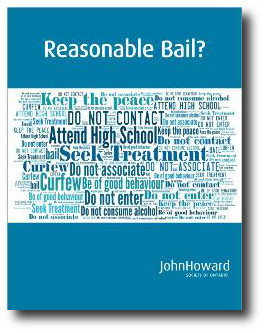 The John Howard Society’s Centre of Research, Policy & Program Development has released a report entitled, Reasonable Bail?, which outlines recommendations for change to Ontario’s bail system. The report found that although crime rates are at an all time low, fewer people are being released on bail compared to 10 years ago. Those that do get bail must wait a long time to do so and must also abide by additional conditions. This makes the bail process especially difficult for those with mental health and addictions issues.
The John Howard Society’s Centre of Research, Policy & Program Development has released a report entitled, Reasonable Bail?, which outlines recommendations for change to Ontario’s bail system. The report found that although crime rates are at an all time low, fewer people are being released on bail compared to 10 years ago. Those that do get bail must wait a long time to do so and must also abide by additional conditions. This makes the bail process especially difficult for those with mental health and addictions issues.
Of the 337 cases reviewed in the report:
- more than 40 percent had mental health issues
- 70 percent had substance (alcohol or drugs) use issues
- 31 percent had concurring mental health and substance use issues.
Of those who were granted bail, placed in bail supervision programs (158 clients) and had current alcohol or drug use issues, about 81 percent were asked not to consume alcohol or to abstain from drugs as part of their bail conditions.
The report goes on to say that people with mental health and addictions issues would find it difficult to follow such conditions and that these types of bail conditions are effectively setting up people to fail.
CMHA Ontario is also addressing this issue in collaboration with the Provincial Human Service and Justice Coordinating Committee (HSJCC). Earlier this year, the Provincial HSJCC conducted a call for bail recommendations after receiving a letter from the Ministry of the Attorney General asking for input.
Recommendations on ways to improve the bail process, similar to those outlined in the John Howard Society Report, were provided to the ministry’s Justice on Target Bail Expert Table. Some of the recommendations included:
- Provide improved access to the accused before and during bail court to improve chances of release (e.g. have interview space available);
- Review Crown briefs in advance and provide bail and mental health court workers access to this information;
- Establish realistic bail conditions (i.e. not expecting persons with an alcohol addiction to not drink);
- Request individuals to have sureties – persons who promise to supervise the accused while that individual is out on bail – only when necessary because finding a suitable surety can be a challenge, particularly for individuals with mental health issues.
For more information about CMHA Ontario’s work with the Provincial Human Services and Justice Coordinating Committee, please visit the HSJCC website.